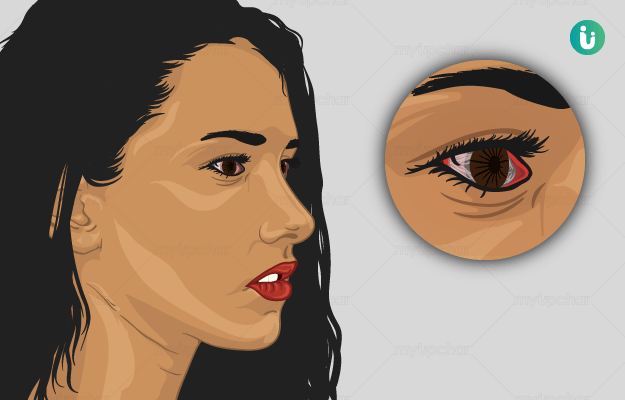What is burning eyes?
Burning eyes are experienced as an itching, stinging or burning sensation in the eye. This often occurs along with a watery discharge from the eyes. Blepharitis, dry eye, conjunctivitis and eye allergies are some of the common causes of burning eyes.
What are its main associated signs and symptoms?
Common symptoms seen along with burning eyes include:
- Discharge from the eyes
- Watery eyes
- Redness of eyes along with soreness
Specific symptoms depending on the underlying disease:
- Blepharitis: It is an inflammation of the eyelid wherein the base of the eyelash shows oily, dandruff-like flakes with presence of stye (presence of red, swollen, lump near eyelid margin)
- Dry eyes: It is characterised by stinging and irritating sensation in the eye; redness of the eye; formation of mucus layers in or around the eye; sensation of something being stuck in the eye
- Eye allergy or conjunctivitis: Allergies and inflammation of the conjunctiva lead to sore, swollen and itchy eyes; teary eyes; itchy, stuffy nose and sneezing
What are the main causes of burning eyes?
Common causes of Burning Eyes include:
- Bacterial infection
- Dysfunction of the tear glands and ducts
- Irritating substances like dust, pollen may enter the eye and cause allergy
- Sunburn associated with overexposure to ultraviolet light
Uncommon causes of Burning Eyes:
- Exposure to smoke, wind or very dry climate
- Long-term use of contact lenses
- Rheumatoid arthritis, thyroid disorders and lupus
- Certain drugs like sleeping pills, heartburn medicines
How is it diagnosed and treated?
Diagnosing the underlying disease is vital in order to treat burning eyes. The doctor takes a thorough medical history, specifically noting down any exposure to allergens or irritating, infective agents.
Physical examination along with the help of a slit microscope is done to examine swelling and redness. Tear flow and consistency of tears are also examined.
Treatment for burning eyes depends on the underlying condition. They include:
- Antibiotics in case of infection.
- Artificial tears or decongestant eye drops and warm compresses in order to relieve sore and swollen eyes.
- In a case of allergy, the doctor will advise staying away from the particular allergen.
Self-care includes the following:
- Maintaining good hygiene is of utmost importance.
- Antibiotic sprays and shampoo, baby shampoo can be used to wash your eyelashes, hair and scalp.
- Use of sunglasses to avoid exposure to sunlight in case of sunburn.
- Saline eye drops are essential in removing allergens after exposure to dust or any other irritants.
- Drinking plenty of water and having fish oil supplements help in keeping the eye moist.

 Doctors for Burning Eyes
Doctors for Burning Eyes  OTC Medicines for Burning Eyes
OTC Medicines for Burning Eyes



















